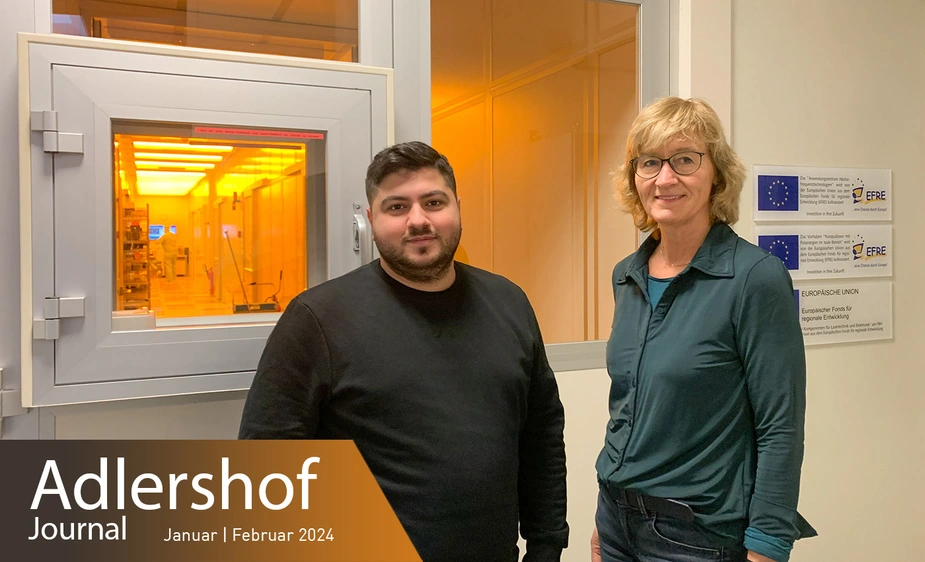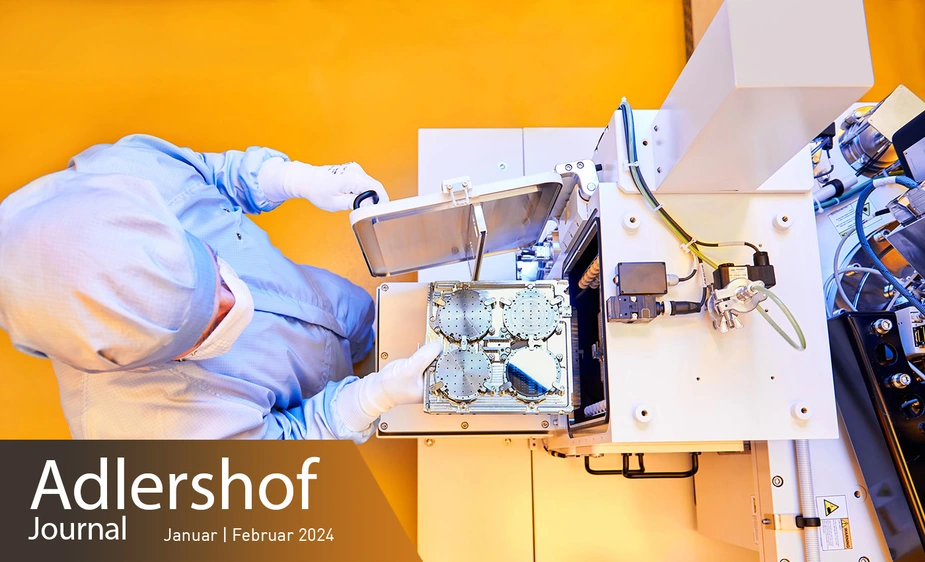A career change into the future
The proANH e.V. association is securing demands for skilled staff in microtechnology by offering advanced vocational training to become an electronics manufacturing specialist
He was looking for a future-proof career opportunity, says Onur Sahin. The 30-year-old was looking to “take a new path.” It was a fabulous stroke of luck that it led him straight to the cleanrooms at Ferdinand-Braun-Institut, Leibniz-Institut für Höchstfrequenztechnik (FBH) in Adlershof. Both for Sahin and the institute.
Filling job openings with suitable applicants is becoming increasingly difficult—especially in key technologies like microtechnology. To do so, ANH Berlin, an education and training network for high technology based at FBH, is routinely breaking new ground. About four years ago, they created proANH e.V. as a regional initiative of more than 20 companies and research facilities in the high-tech sector in Berlin and Brandenburg, in addition to several, nationwide projects advocating the promotion of technology specialists.
“Those were the days,” says Uta Voigt looking back, who is the regional network’s local coordinator, “when we had 70 or 80 applicants for three apprenticeships at FBH.” Today, it is significantly more difficult to fill open positions. There are many reasons for this. Demographic change is the one most cited, but it’s by far not the only one. Many people are quite simply not familiar with the occupation of microtechnologist, which was first created in Germany in the late 1990s.
While the classic path into microtechnology for technical staff was through the dual education system, the demand for qualified, skilled staff in this and many other sectors can no longer be met through the in-house training of new recruits. It is against this backdrop that proANH had an idea for improving the way career changers attain qualification. In 2023, they developed and tested an advanced training programme called ‘Fachkraft Elektronikfertigung’ to qualify electronics manufacturing specialists in cooperation with the Federal Employment Agency Berlin Southeast, bbw Bildungswerk der Wirtschaft, and several other member companies. Onur Sahin is one of the first graduates.
Though he was interested in tech, Sahin didn’t know much about clean rooms, microtechnology, and microchips. “This was an industry,” says Sahin, who was between jobs at the time, “that wasn’t on my radar at all.” Initially, he and other interested applicants attended an information event about the five-month training course and the technology field in general, where they also had the opportunity to speak to member companies directly. To make things “as concrete as possible”, adds Uta Voigt, visits to the companies are part of the training early on. Sahin also appreciated this. “We visited a cleanroom and learned a lot about the workplace and the individual work steps in wafer manufacturing. I immediately felt like what I see is what I got.”
Various occupational groups take part in wafer manufacturing, ranging from researchers to apprentices. “Not everybody involved needs to complete a three-year apprenticeship,” explains Uta Voigt. In the career change programme, participants are made fit with four months of theory in electrical engineering, chemistry fundamentals, as well as semiconductor, microsystems, and instruments technology. Additionally, employment law, work safety, and a bit of English. A crucial element is the four-week internship, where the theory is put into practice, and all those involved decide whether and how they will continue working together in the future.
In 2023, 21 graduates entered permanent employment with the association’s member companies. A great success, says Uta Voigt. There is another thing she is particularly pleased with. All the members are looking for staff, but competition plays a minor role at best. Although competing for skilled employees, the member companies are pulling in the same direction. “They know what’s at stake and that joining forces within the network will pay off.” Preparations for the now third round of training commenced in November 2023 and more are planned.
Onur Sahin has completed the FBH internship and learned everything there is to know for a career change into working under cleanroom conditions, including wearing a protective suit from head to toe, face masks, and gloves. He is looking forward to his new coworkers and a job with a bright future.
Rico Bigelmann for Adlershof Journal

